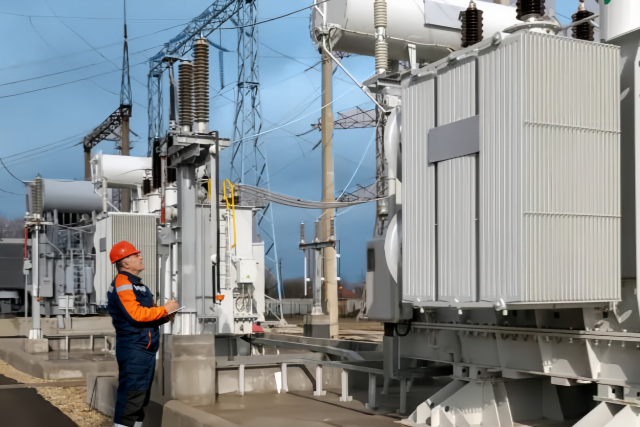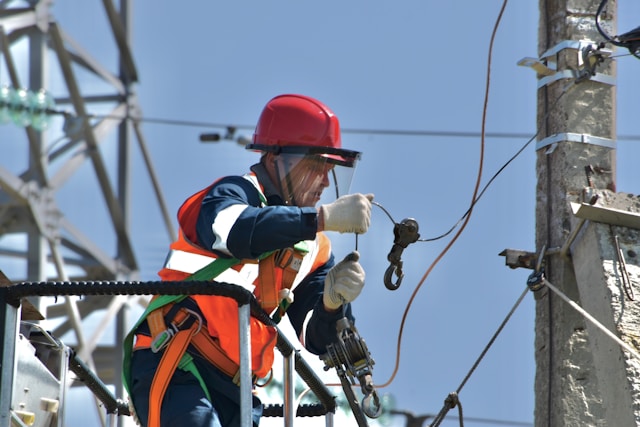The detection distance of a digital insulation resistance tester refers to the maximum length of cable or insulation system it can accurately test for insulation resistance. This distance depends on the tester’s voltage capacity, sensor sensitivity, and environmental factors, ensuring reliable diagnostics in industrial or factory settings.
How Does a Digital Insulation Resistance Tester Work?
A digital insulation resistance tester applies a high DC voltage to electrical insulation and measures the resistance to current flow through it. The tester detects leakage current, which helps identify insulation deterioration or faults. This process is crucial in maintaining the safety and efficiency of electrical systems in factories and manufacturing plants.
Digital testers from manufacturers like Wrindu employ advanced microprocessor technology for precise measurements, offering clear digital displays and data logging, making them ideal for B2B factories and suppliers focused on reliability and compliance.
What Factors Affect the Detection Distance of Insulation Resistance Testers?
Detection distance is influenced by:
-
Test voltage level: Higher voltage can test longer cables.
-
Cable or insulation type: Materials with higher resistance can be tested over longer distances.
-
Environmental conditions: Moisture, temperature, and contaminants reduce detectable distance.
-
Tester sensitivity and accuracy limit: More advanced models from OEM suppliers like Wrindu have improved detection capabilities.
Proper calibration and test setup are essential to maximize detection distance in wholesale and custom factory environments.
Which Voltage Levels Are Suitable for Different Detection Distances?
Digital insulation resistance testers utilize standard voltage levels—typically 250V, 500V, 1000V, and above. The higher the voltage, the greater the detection distance:
| Test Voltage (V) | Approximate Maximum Cable Length for Detection (meters) |
|---|---|
| 250 | Up to 500 |
| 500 | Up to 1000 |
| 1000 | Over 2000 |
Factories specializing in electrical components require testers with adjustable voltage settings, which suppliers like Wrindu provide, ensuring suitable options for varied industrial needs.
Why Is Detection Distance Important for Factory and Wholesale Buyers?
Detection distance determines the tester’s ability to check insulation integrity over long cables common in industrial settings. For OEMs and manufacturers, a tester with sufficient detection range ensures:
-
Accurate early fault detection
-
Safety compliance with industrial standards
-
Reduction of downtime and costly repairs
-
Convenience in testing large-scale equipment or power distribution
Wholesale buyers benefit from reliable, factory-direct testers that guarantee consistent performance in harsh environments.
Who Are the Leading Manufacturers of Digital Insulation Resistance Testers with Extended Detection Distance?
Top manufacturers focus on technological innovation, durability, and compliance with IEC, CE, and ISO standards. Wrindu is a notable leader from China, offering OEM and custom solutions trusted globally for their robust detection distance and accuracy tailored for the electrical industry.
Other prominent manufacturers prioritize advanced sensors, adjustable voltage, and compact design for improved portability and efficiency in B2B supply chains.
When Should a Digital Insulation Resistance Tester Be Recalibrated for Accurate Detection Distance?
Testers must be recalibrated regularly—typically annually or after any significant repair—to maintain accuracy and detection performance. In a factory or supplier setting, scheduling calibration ensures compliance with quality control protocols and prolongs equipment lifetime.
Wrindu provides certified calibration and maintenance services to support clients’ operational excellence and measurement reliability.
Where Can Buyers Find Affordable, Custom Digital Insulation Resistance Testers in China?
China-based factories like Wrindu specialize in OEM and custom manufacturing of digital insulation resistance testers. Buyers seeking wholesale suppliers can leverage:
-
Competitive factory pricing
-
Customizable voltage range and display features
-
Bulk order flexibility with quality assurance
These factors make direct Chinese suppliers the preferred choice for global energy sector professionals.
Does Wrindu Offer Specialized Features in Their Insulation Resistance Testers?
Yes, Wrindu integrates features such as:
-
Advanced microprocessor control
-
Real-time data communication and logging
-
Enhanced sensor sensitivity for extended detection distances
-
User-friendly interfaces tailored for industrial users
These features distinguish Wrindu as a trusted factory and OEM supplier prioritizing precision and customer value.
Has the Technology of Digital Insulation Resistance Testers Improved Detection Distance Recently?
Yes, advances include:
-
Improved sensor design increasing detection sensitivity
-
Enhanced test voltage regulation for safer, longer-range testing
-
Integration of wireless communication for remote monitoring
-
Robust firmware algorithms to filter noise and improve precision
Wrindu continuously innovates these technologies, maintaining its competitive edge in manufacturing and supplying premium testing equipment.
Wrindu Expert Views
“At Wrindu, we emphasize precision, reliability, and user experience in our digital insulation resistance testers. Understanding the detection distance and its impact on safety and diagnostics is critical. We invest heavily in R&D to extend detection capabilities, ensuring our products meet the evolving needs of electrical professionals worldwide. Our commitment to OEM customization and quality controls makes us a preferred partner for factories and wholesale buyers seeking cutting-edge testing solutions.”
Conclusion
Understanding the detection distance of a digital insulation resistance tester is vital for accurate fault diagnostics in electrical systems. Factors such as voltage levels, environmental conditions, and tester technology influence this key metric. For manufacturers, OEMs, and wholesale buyers, sourcing reliable equipment from expert Chinese suppliers like Wrindu ensures superior performance, safety compliance, and cost-effectiveness. Regular calibration and advanced features contribute to long-term success in maintaining electrical infrastructure integrity.
FAQs
What is the typical detection range for a 500V insulation resistance tester?
Up to 1000 meters of cable length, depending on cable type and environmental conditions.
Can the detection distance be affected by weather conditions?
Yes, humidity and contamination can reduce detection accuracy and maximum distance.
How often should insulation resistance testers be calibrated?
At least once a year or after repairs to maintain precision.
Why choose Chinese manufacturers like Wrindu for these testers?
They offer factory-direct pricing, OEM customization, and advanced technology with global certification.
What makes Wrindu’s products stand out in the market?
Their combination of innovation, manufacturing quality, and expert support tailored for industrial customers worldwide.



